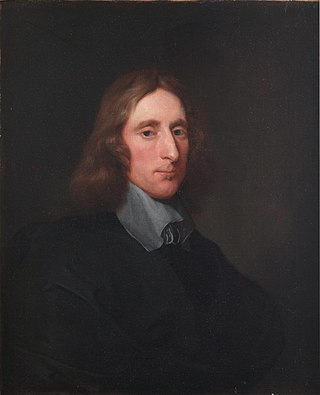
The Commonwealth was the political structure during the period from 1649 to 1660 when England and Wales, later along with Ireland and Scotland, were governed as a republic after the end of the Second English Civil War and the trial and execution of Charles I. The republic's existence was declared through "An Act declaring England to be a Commonwealth", adopted by the Rump Parliament on 19 May 1649. Power in the early Commonwealth was vested primarily in the Parliament and a Council of State. During the period, fighting continued, particularly in Ireland and Scotland, between the parliamentary forces and those opposed to them, in the Cromwellian conquest of Ireland and the Anglo-Scottish war of 1650–1652.

Richard Cromwell was an English statesman who was the second and last Lord Protector of the Commonwealth of England, Scotland and Ireland and son of the first Lord Protector, Oliver Cromwell.

Praise-God Barebone was an English leather-seller, preacher, and Fifth Monarchist. He is best known for giving his name to the Barebone's Parliament of the English Commonwealth of 1653.

The Protectorate, officially the Commonwealth of England, Scotland and Ireland, is the period from 16 December 1653 to 25 May 1659 during which England, Wales, Scotland, Ireland and associated territories were joined together in the Commonwealth of England, governed by a Lord Protector. It began when Barebone's Parliament was dismissed, and the Instrument of Government appointed Oliver Cromwell Lord Protector of the Commonwealth. Cromwell died in September 1658 and was succeeded by his son Richard Cromwell.

Barebone's Parliament, also known as the Little Parliament, the Nominated Assembly and the Parliament of Saints, came into being on 4 July 1653, and was the last attempt of the English Commonwealth to find a stable political form before the installation of Oliver Cromwell as Lord Protector. It was an assembly entirely nominated by Oliver Cromwell and the Army's Council of Officers. It acquired its name from the nominee for the City of London, Praise-God Barebone. The Speaker of the House was Francis Rous. The total number of nominees was 140, 129 from England, five from Scotland and six from Ireland.

The English Council of State, later also known as the Protector's Privy Council, was first appointed by the Rump Parliament on 14 February 1649 after the execution of King Charles I.

The First Protectorate Parliament was summoned by the Lord Protector Oliver Cromwell under the terms of the Instrument of Government. It sat for one term from 3 September 1654 until 22 January 1655 with William Lenthall as the Speaker of the House.
The Interregnum was the period between the execution of Charles I on 30 January 1649 and the arrival of his son Charles II in London on 29 May 1660 which marked the start of the Restoration. During the Interregnum, England was under various forms of republican government.

Philip Sidney, 3rd Earl of Leicester was an English politician who sat in the House of Commons at various times between 1640 and 1659 and became Earl of Leicester in 1677. He supported the Parliamentarian cause in the Wars of the Three Kingdoms, when he was known as Viscount Lisle, a subsidiary title of the Earls of Leicester.

The Tender of Union was a declaration of the Parliament of England during the Interregnum following the War of the Three Kingdoms stating that Scotland would cease to have an independent parliament and would join England in its emerging Commonwealth republic.
Colonel Philip Jones was a Welsh military leader and politician who sat in the House of Commons between 1650 and 1656. He rose to the rank of Colonel in the service of the Parliamentary Army under Fairfax during the English Civil War. As Governor of Swansea he successfully held the town against the Royalist forces.
Richard Salwey was an English politician who sat in the House of Commons variously between 1645 and 1659. He was a republican in politics and fought on the Parliamentary side in the English Civil War.
John Clarke, also known as John Clark, John Clerk, and John Clerke, was an English politician and Justice of the Peace who sat in the House of Commons from 1653 through 1660, and was a colonel in the Parliamentary army between 1651 and 1659.

Sir Edward Hungerford (1596–1648) of Corsham, Wiltshire and of Farleigh Castle in Wiltshire, Member of Parliament, was a Parliamentarian commander during the English Civil War. He occupied and plundered Salisbury in 1643, and took Wardour and Farleigh castles.
Thomas Atkins was Lord Mayor of London and an English politician who sat in the House of Commons in 1640 and from 1647 to 1653 and was Lord Mayor of London in 1644. He supported the Parliamentary cause in the English Civil War.
Robert Cunliffe was an English politician who sat in the House of Commons in 1653.
Samuel Moyer was an English merchant and politician who sat in the House of Commons in 1653. He was a strong republican and supporter of the Parliamentary cause in the English Civil War.
Sir Richard Chiverton of the Worshipful Company of Skinners was Lord Mayor of London in 1658.
Daniel Abbot was a colonel of a regiment of dragoons in the New Model Army who fought throughout the Cromwellian conquest of Ireland and settled in the country once the war was over.
Edward Cludd (1603–1678) was a Justice of the Peace and Knight of the Shire for the County of Nottingham during the Interregnum. He supported the Parliamentary cause in the English Civil War.








